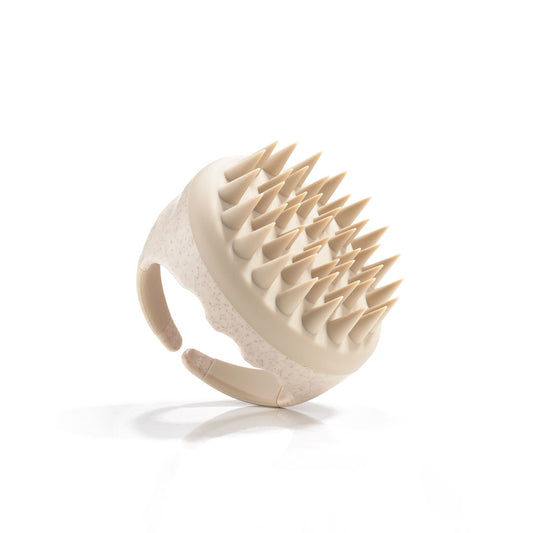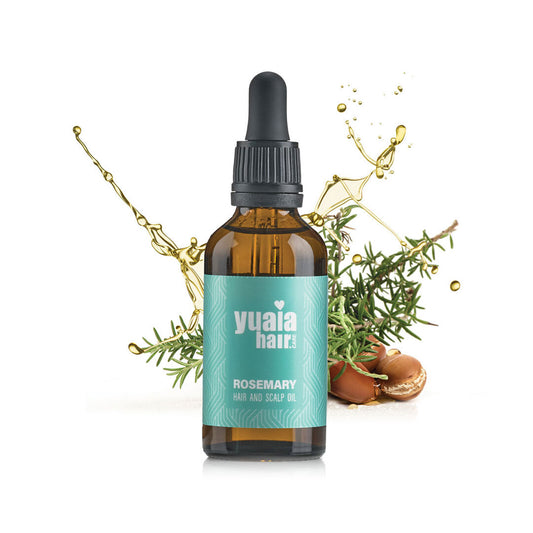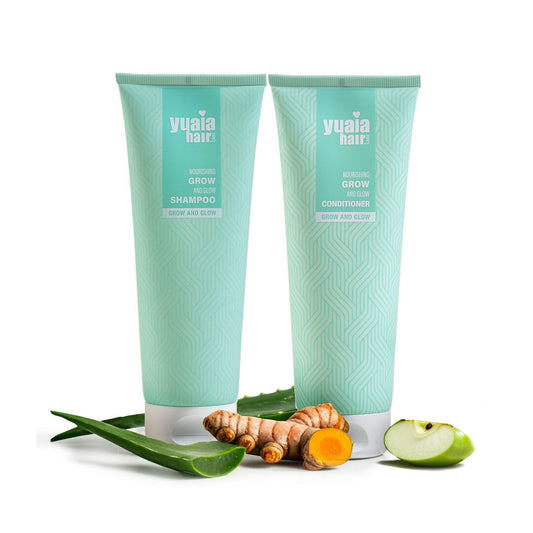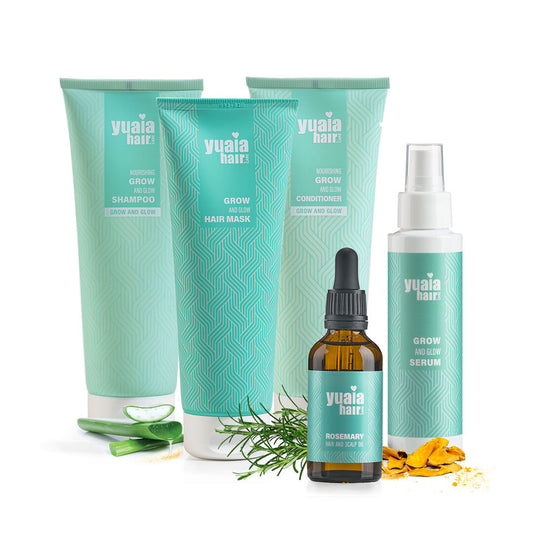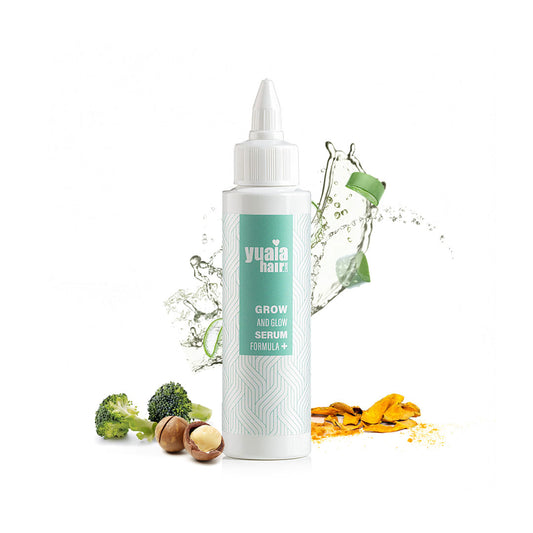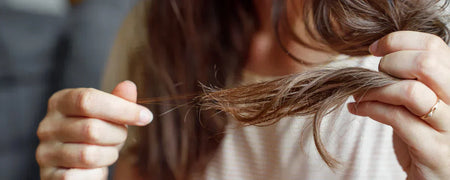
Common reasons why your hair is not growing
If your hair seems to be stuck at the same length, several factors could be affecting its growth. From poor scalp health to daily hair care habits, understanding the root cause can help you find the best solutions to support healthy hair growth.
Genetics
Genetics significantly influence hair growth patterns and the likelihood of hair loss. Conditions such as androgenetic alopecia, commonly known as male or female pattern baldness, are hereditary and result in progressive hair thinning over time. Research indicates that variations in the androgen receptor gene (AR) are linked to the development of male pattern hair loss.
Understanding your family's history with hair loss can provide insights into your own hair growth trajectory.
Age
As we age, it's natural for hair growth to slow, and hair strands to become finer and less pigmented. Hair follicles gradually produce thinner hair, and some may cease producing hair altogether. This process can lead to noticeable thinning and changes in hair texture.
Implementing age-appropriate hair care routines can help manage these changes.
Hormonal Imbalances
Hormonal fluctuations can disrupt the normal hair growth cycle. Thyroid disorders, such as hypothyroidism and hyperthyroidism, can lead to diffuse hair loss across the scalp. In hypothyroidism, insufficient thyroid hormone production can cause hair follicles to enter the resting phase prematurely, resulting in hair shedding. Conversely, hyperthyroidism, characterized by excessive thyroid hormone production, can also affect hair health.
Nutritional deficiencies
A balanced diet is crucial for maintaining normal hair. Nutrients like iron, biotin, and vitamin D play key roles in supporting hair health. Ensuring an adequate intake of these vitamins and minerals helps maintain normal hair.
Stress
Chronic stress has been shown to trigger hair loss conditions like telogen effluvium, where hair prematurely enters the resting phase of its growth cycle, leading to increased shedding. This condition can significantly affect the overall thickness and density of your hair.
To mitigate the impact of stress on hair health, it's important to incorporate relaxation techniques such as meditation, deep breathing exercises, or yoga. Regular exercise and adequate sleep also play vital roles in reducing stress levels and promoting overall well-being. By managing stress effectively, you can help reduce hair loss and support healthier hair growth.
Scalp health
A healthy scalp is crucial for promoting hair growth, as it provides the foundation for hair follicles to thrive. Conditions like dandruff, psoriasis, and folliculitis can lead to inflammation, clogged follicles, and poor circulation, creating an unfavorable environment for hair growth. To maintain scalp health, it's important to follow a proper hair care routine, including regular cleansing to remove buildup and excess oils. Treating underlying scalp conditions with the right products or medications is key to restoring balance and ensuring an optimal environment for hair follicles. A healthy scalp supports healthier, stronger hair growth over time.
Hair care practices
Certain hair care practices, if not approached with care, can contribute to hair breakage and impede hair growth. Frequent use of heat styling tools, such as flat irons, curling irons, and blow dryers, can weaken the hair strands by stripping them of moisture and essential oils.
This damage makes hair more prone to breakage and thinning. Additionally, chemical treatments like coloring and perming can compromise the hair shaft, leaving it brittle and prone to split ends and breakage. Overuse of these treatments can result in long-term damage to the hair's natural structure.
Another common culprit is tight hairstyles. Styles that pull tightly on the hair, such as ponytails, braids, and buns, can lead to traction alopecia, a condition caused by tension on the hair follicles, which can result in hair loss over time. This is particularly problematic if the tension is consistent and long-term.
To preserve hair strength and promote growth, it's important to adopt gentle hair care practices. Minimizing the use of heat styling tools and harsh chemical treatments can reduce damage. Opting for loose hairstyles and using hair accessories that don't pull too tightly on the hair can help protect the follicles. Embracing these practices will help maintain healthy, strong hair.
How to improve your hair growth at home
Improving hair growth at home doesn’t always have to require expensive treatments. By adopting simple, natural methods such as regular scalp massages, using nourishing oils, and adjusting your hair care routine, you can create an optimal environment for your hair follicles, promoting healthier, stronger hair growth over time.
Scalp massage
Regular scalp massages can effectively promote hair health and growth with minimal cost and effort. Massaging the scalp increases blood circulation, which helps deliver essential nutrients to hair follicles, supporting growth and reducing muscle tension. Research suggests that consistent daily scalp massages may lead to increased hair thickness and growth, though results can vary from person to person.
This simple practice can be done with your fingertips or with a scalp massager, adding a relaxing element to your routine. By incorporating scalp massages into your daily hair care routine, you can support healthier, stronger hair over time.
Natural oils for hair growth
Incorporating natural oils into your hair care routine can provide significant benefits to hair health. These oils nourish the scalp, improve circulation, and promote stronger, healthier hair growth. Here are some oils commonly used for hair growth:
-
Coconut oil: Coconut oil is rich in lauric acid, which allows it to penetrate deeply into the hair shaft and follicles, providing hydration and strengthening the hair. It also has antimicrobial properties, which help maintain a healthy scalp by preventing dandruff and other scalp issues.
-
Rosemary oil: Known for its ability to improve blood circulation to the scalp, rosemary oil can stimulate hair follicles and encourage hair growth. Some studies have suggested that rosemary oil may even be as effective as minoxidil for treating hair loss, though more research is needed.
-
Peppermint oil: Peppermint oil contains menthol, which helps to increase blood flow to the scalp, promoting the nourishment of hair follicles. Peppermint oil also has a cooling effect, which can soothe irritation and balance scalp oil production.
When using essential oils like rosemary or peppermint, it’s essential to dilute them with a carrier oil such as coconut or jojoba oil to prevent irritation. Always perform a patch test before applying them directly to the scalp to ensure there is no adverse reaction.
What are the best hair growth products?
Finding the right products to support hair growth is essential for achieving healthier, thicker hair. At Yuaia Haircare, we offer a range of effective solutions designed to nourish your scalp and promote hair growth. Now we will recommend some of our best hair growth products to try.
Our Glow and Grow shampoo and conditioner
Our Glow and Grow Shampoo and Conditioner are expertly formulated to stimulate hair growth, reduce hair loss, and improve hair thickness. Infused with fruit acids, they provide gentle exfoliation of the scalp, promoting a fresh and clean feeling while removing buildup.
The inclusion of Capilia Longa, a powerful ingredient backed by scientific studies, has shown to reduce hair loss by up to 89% and increase hair density by up to 52% after 150 days of consistent use. This combination of ingredients helps create the ideal environment for healthy hair growth, improving both the condition and appearance of your hair.
Whether you're experiencing thinning or simply want to support stronger hair, our Glow and Grow Shampoo and Conditioner are good choices.
Our Rosemary Oil
Our Rosemary Oil is carefully formulated to stimulate hair growth and enhance scalp health. It combines the power of rosemary oil with nourishing ingredients such as broccoli seed oil, jojoba oil, almond oil, argan oil, and coconut oil.
Rosemary oil is known for improving blood circulation to the scalp, which helps nourish hair follicles and promote healthier hair growth. The additional oils provide deep hydration and support the scalp, preventing dryness and irritation.
Together, these ingredients help strengthen hair, reduce thinning, and create a healthier, thicker appearance over time. Regular use of our Rosemary Oil can contribute to vibrant, well-nourished hair.
Grow and Glow Serum Formula+
The Grow and Glow Serum Formula+ is a treatment designed to work alongside our shampoo and conditioner to promote hair growth and overall hair health. To use, simply lift sections of your hair and spray the serum directly onto the scalp, focusing on areas with the greatest need.
Gently massage the serum into the scalp to ensure even distribution. There is no need to rinse, allowing the serum to work throughout the day.
Enriched with nourishing ingredients, this serum supports hair follicles and increases blood circulation. It enhances the effectiveness of our shampoo and conditioner, ensuring long-lasting results. With consistent use, the Grow and Glow Serum Formula+ helps promote thicker, fuller hair while maintaining a healthy, balanced scalp.
When should you consult a professional?
If you're noticing significant hair loss, sudden or patchy shedding, or more hair falling out than usual, it’s important to consult a dermatologist. Early diagnosis can prevent further hair loss and improve the chances of regrowth. A dermatologist will help identify the root cause of your hair loss and suggest the most effective treatments. They may conduct tests like blood work or a scalp biopsy to diagnose conditions such as alopecia areata, androgenetic alopecia, or scalp disorders.
Consulting a professional is particularly crucial if you’re unsure of the cause of your hair loss. With the right treatment plan, a dermatologist can guide you toward effective solutions and help you regain control of your hair health. Seeking professional advice sooner rather than later can make all the difference in managing hair loss and promoting healthier hair growth.
Growing strong hair: Holistic approach to hair health
A holistic approach to hair health focuses on nurturing your hair from the inside out. Incorporating home remedies, such as scalp massages and natural oils, along with healthy lifestyle habits like a balanced diet, stress management, and gentle hair care, can significantly support hair growth. Patience and consistency are key to seeing results, as changes take time. If you don’t notice improvement, it’s important to consult a professional. A dermatologist or trichologist can help identify underlying issues and provide tailored treatments to promote healthy hair growth and address any concerns effectively.
 2-5 day delivery
2-5 day delivery
 25.000+ satisfied customers
25.000+ satisfied customers
 Satisfaction Guarantee
Satisfaction Guarantee




















